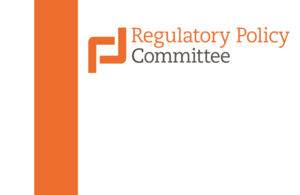The RPC publishes opinions on fit for purpose impact assessments
Published impact assessment opinions based on external, independent scrutiny of new regulation by the Regulatory Policy Committee.

Final stage impact assessments
Of the opinions published today, the RPC has confirmed as fit for purpose three final stage impact assessments. This includes validating the estimated costs and benefits to business and civil society organisations:
-
Pension charges cap
A previous RPC opinion, published in December, set out why the impact assessment for this proposal was not fit for purpose at that time. The Government has now revised its assessment to set out how controls on the levels of charges for some pensions will affect businesses. The RPC has confirmed that the estimated cost of £18.8 million each year is robust.
-
Migration cap (tiers 1 and 2)
The RPC has validated the Government’s estimate that the cap on migration for professionals and experts will cost £0.5 million each year. This is lower than the Department’s initial calculation of £22 million each year, estimated when the policy was introduced, because evidence from the last two years shows that the annual number of migrants with offers of employment has not reached the level of the cap, and as such the cap has not yet had an impact.
-
Early conciliation
The RPC has confirmed the Department’s assessment that a measure that will require conciliation before employment cases are taken to tribunal will be net beneficial to businesses. This is because of the avoided costs of employment tribunals. This will result in benefits to business of £24 million each year. As a beneficial piece of new regulation this will score as “zero net cost” in the Government’s One-in Two-out account.
The RPC has validated the cost to business and civil society organisations for four regulatory changes that originate from the European Union or international agreement:
-
Trust and transparency
This is a package of four regulatory reforms to improve the transparency of corporate structures, in order to reduce damage from illicit activity and improve trust in corporate governance. These measures are not in scope of the Government’s One-in Two-out account, because they stem from a G8 international agreement. The RPC has rated all four impact assessments as fit for purpose. Together the impact assessments estimate a cost to business of £100 million each year.
-
Updating labelling requirements in the Aerosol Dispensers Regulations (EU Directive 2013/10/EU)
The RPC has confirmed that this update of existing requirements will have a cost to business of £0.45 million each year.
-
Consolidation of English national law for food safety and food hygiene
The RPC has confirmed that this consolidation, allowing business to access relevant legal requirements more easily, will have a benefit to business of £0.15 million each year.
-
EU Directive on patients rights in cross-border healthcare
The proposal is to establish a National Contact Point (NCP) in the UK, which has resource implications for the Department of Health and the National Health Service (NHS), but not for business. Therefore the RPC’s assessment confirms there is no direct impact on business.
Consultations on new regulatory proposals
The RPC has confirmed as fit for purpose nine impact assessments relating to consultations on new regulatory proposals to be introduced by the Government. This means the RPC agrees that the impact assessments contain sufficient information to support the consultation process.
One of these impact assessments was judged to require no changes prior to consultation (Green-rated):
- Alternative dispute resolution for cross border purchases to provide better resolution of contractual disputes between consumers and business.
Eight of these impact assessments were judged to need further changes before going out to consultation (Amber-rated):
- Insolvency practitioner fee regime to address concerns about getting better value from the fee structure and regulatory regime.
- Small business appeals champion to provide assurance to business and Government that regulators are delivering against the goals relating to appeals and complaints set out in the new statutory Regulators Code.
- Duty of candour on healthcare providers to introduce a statutory duty of candour on health and social care providers, and how this would impact on businesses by way of setting up and running the necessary and appropriate systems to meet the requirements of the proposal.
- Review of Care Quality Commission (CQC) registration requirements to revise the CQC registration requirements upon providers, specifically removing the need to issue a warning notice prior to prosecution. The revision of the requirements aims to make them simpler and easier to follow and therefore reducing the burden of regulation for providers.
- Fit and proper persons requirements for directors of health and social care organisations to ensure providers take proper steps to see that their directors are fit and proper for their role, as currently 20% of providers are not undertaking proper reviews of the fitness of their directors.
- Requirements for energy suppliers to provide key, personal information on consumer’s bill in a machine readable format.
- Amendments to Children’s Homes Regulation 2001 to improve the provision of high quality care within the Children’s Homes system ensuring that the most vulnerable children are effectively safeguarded.
- Minimum governance standards for direct contribution workplace pensions to require the establishment of independent governance committees responsible for ensuring pension funds are run in the best interest of members.